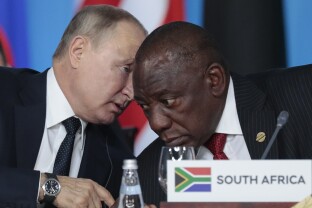Ties between South Africa and the U.S. have been deteriorating for years, and last week, they unraveled even further.
The House Foreign Affairs Committee approved a bill, on a wide bipartisan basis, that would review the trading partnership between the U.S. and South Africa. Republican Rep. John James, who introduced the bill, said doing so was “important to show the American people that they will no longer be played as fools.”
U.S. officials have been watching with unease as South Africa, its largest trading partner on the African continent, allied with Russia in the wake of the Ukraine invasion and has pursued closer relations with China. James introduced the bill to review the U.S.-South Africa partnership with Democratic Rep. Jared Moskowitz in February, a month after South Africa sued Israel in the International Court of Justice and accused Israel of committing genocide in Gaza.
“It’s a complicated relationship,” Democratic Sen. Chris Coons, the chair of the Africa subcommittee on Senate Foreign Relations, told NOTUS. “It’s a deep relationship that goes back decades.”
Coons said he has “heard concerns from many of my colleagues” about South Africa.
Rep. Dean Phillips, who supported the bill in committee, described it as a “reasonable approach” to his “disappointment, so far, in the activities of the South African government.” He emphasized, though, that he was not condemning South Africa.
“It’s not a thumbs-up or thumbs-down,” he told NOTUS. “But it is an assessment.”
But a number of Democrats are frustrated with the bill — and how their colleagues are approaching the relationship.
Rep. Gregory Meeks, the ranking member in the committee, argued before the vote that the U.S. shouldn’t get to impose its ideas and should “make a compelling case [to South Africa] for why it makes sense to partner with the United States.” He added that the bill was duplicative of a yearly review process the U.S. conducts with countries under the Africa Growth and Opportunity Act — a program that allows select African countries to trade with the U.S. duty-free.
Reps. Sydney Kamlager-Dove and Jonathan Jackson concurred, both describing South Africa as a “sovereign country” with the ability to determine and manage its own diplomacy undertakings.
“It’s also true that many countries across the continent and also in [the] Western Hemisphere have relationships with the United States and also have relationships with China,” Kamlager-Dove told NOTUS after the markup.
Rep. Bennie Thompson, who doesn’t sit on the committee (but attended Nelson Mandela’s inauguration in 1994), told NOTUS that Congress has more pressing domestic issues and that he would “hate to see anything coming out of this body that would inhibit decisions made by South Africans.”
“I have farmers in my district who trade with some of our adversaries, but we don’t get off into who they’re talking to,” he said.
It’s unclear if Republican leadership will take up the bill as Speaker Mike Johnson has an increasingly long list of urgent priorities Congress needs to tackle, not to mention the possibility he could lose his job (Republican Majority Leader Steve Scalise’s office did not return a request for comment on scheduling).
But the mere presence of the House bill has top South African leaders fretting that Congress will ultimately revoke the country’s status under the AGOA.
“[Members of Congress] make conclusions about South Africa’s international relations without necessarily speaking to us, and this is very troubling,” South Africa’s top diplomat, Minister Naledi Pandor, told the Carnegie Endowment for International Peace during a recent trip to Washington, D.C. She, however, said that her country was on better terms with the Biden administration than Congress itself.
In November 2023, Sen. James Risch, ranking member on the Senate Foreign Relations Committee, wrote a letter to Secretary of State Antony Blinken expressing disappointment in the Biden administration’s decision to renew South Africa’s AGOA status and allow it to host the 2023 AGOA conference after a Russian vessel docked on a South African port.
Sen. Ben Cardin, chair of the Senate Foreign Relations Committee, told NOTUS that he had “candid discussions” with Pandor during her recent visit to the U.S. and raised issues about “South Africa’s alliance on certain fundamental global issues.”
Moskowitz, the Democrat who helped introduce the bill, was adamant that the bill was only a first step.
“Whether willingly or unwillingly, South Africa is doing China and Russia’s bidding. [The U.S.] obviously knows where our relations right now stand with both Russia and China. If [South Africa] wants to curry favor with Russia and China, then obviously the United States needs to examine that and figure out how we want to deal with it,” he told NOTUS.
—
Tinashe Chingarande is a NOTUS reporter and an Allbritton Journalism Institute fellow.
Sign in
Log into your free account with your email. Don’t have one?
Check your email for a one-time code.
We sent a 4-digit code to . Enter the pin to confirm your account.
New code will be available in 1:00
Let’s try this again.
We encountered an error with the passcode sent to . Please reenter your email.


